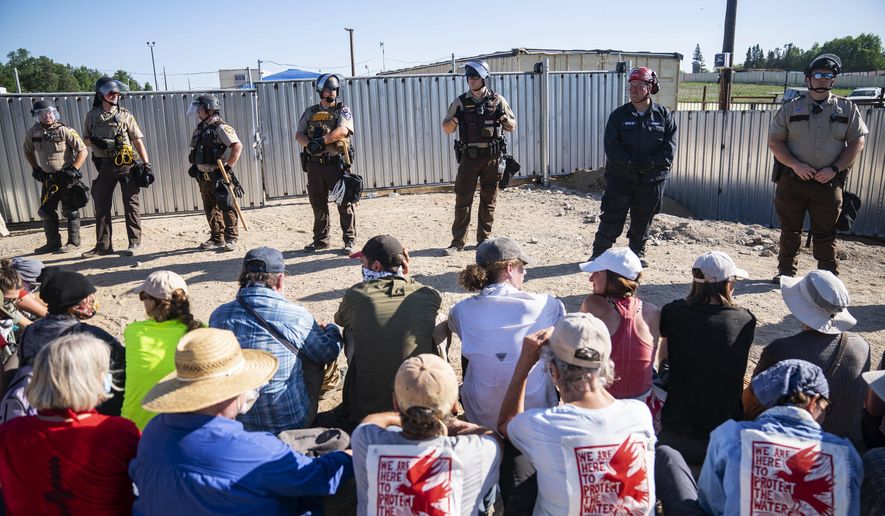The Minnesota Court of Appeals handed pipeline protesters a defeat Monday with a ruling in favor of the Enbridge Line 3 as activists kept up their efforts to disrupt construction on the hotly contested project.
In a 2-1 decision, a three-judge panel held that the state’s independent Public Utilities Commission acted correctly in approving the Environmental Impact Statement [EIS] and issuing the route permit and certificate of need on the 337-mile replacement segment in northern Minnesota.
Judge Lucinda Jesson found that the commission’s decision came after “vigorous public debate” and against the backdrop of a federal consent decree as well as safety concerns about the deteriorating pipeline built in the 1960s to run crude oil from Alberta, Canada, to U.S. refineries.
“With an existing, deteriorating pipeline carrying crude oil through Minnesota, there was no option without environmental consequences,” said Judge Jesson in the 78-page opinion. “The challenge: to balance those harms. There was no option without impacts on the rights of Indigenous peoples. The challenge: to alleviate those harms to the extent possible. And there was no crystal ball to forecast demand for crude oil in this ever-changing environment.”
Canada-based Enbridge Energy called the decision “an important acknowledgment of the Minnesota Public Utilities Commission’s thorough review of the Line 3 Replacement Project.
“The decision is not unexpected,” said the Enbridge statement. “Line 3 has passed every test through six years of regulatory and permitting review including 70 public comment meetings, appellate review and reaffirmation of a 13,500-page EIS, four separate reviews by administrative law judges, 320 route modifications in response to stakeholder input, and multiple reviews and approvals.”
The likely next stop is the Minnesota Supreme Court for climate and tribal groups, backed by the state Department of Commerce, seeking to stop construction on the $3 billion project, which is now 60% complete.
Minnesota Court of Appeals affirms the #Line3 revised FEIS, Certificate of Need & Route Permit. https://t.co/jnJw5Bob1V
— Enbridge (@Enbridge) June 14, 2021
Margaret Levin, Sierra Club North Star Chapter state director, called the decision “deeply disappointing” and renewed calls for President Biden to stop the project by pulling the federal Army Corps of Engineers permit.
Pipeline foes were buoyed last week when TransCanada Energy canceled the Keystone XL pipeline after a 13-year battle, precipitated by Mr. Biden’s Day One decision to pull the cross-border permit approved in 2017 by President Trump.
“Construction on Line 3 is underway — all eyes now turn to the Biden administration to live up to their commitments to climate action and Indigenous rights by stopping Line 3,” said Ms. Levin in a statement.
Also ongoing are protests following last weekend’s Treaty People Gathering, a mass demonstration that drew upwards of 1,000 activists, including actress Jane Fonda, and resulted in about 250 arrests for trespassing, public nuisance and unlawful assembly at the Two Inlets pump station in Hubbard County.
Today the MN Court of Appeals ruled in favor of Enbridge, and they will be allowed to continue building Line 3. We will stand strong and continue the fight to #StopLine3! https://t.co/IrTL8AvdvE
— Resist Line 3 (@ResistLine3) June 14, 2021
Since then, protesters have camped out at the Clearwater County construction site, prompting Enbridge to issue a letter Saturday demanding that they leave or face charges of criminal trespass.
Dawn Goodwin of the RISE Coalition responded by insisting that “our presence is peaceful, nor are we trespassing. Truth is, it’s Enbridge and its workers who have endangered the health and safety of our Indigenous people.
“Enbridge and the state of Minnesota have repeatedly failed to respect our treaty rights, our lands, and our water,” she said in a video message on Facebook.
Enbridge pointed out that it has the support of the two tribes whose reservations are crossed by the existing pipeline, the Leech Lake Band of Ojibwe and the Fond du Lac Band of Lake Superior Chippewa.
The project also included a first-of-its-kind tribal cultural resource survey led by the Fond du Lac.
“Fond du Lac employed tribal cultural experts who walked the full route identifying and recording significant cultural resources to be avoided,” said Enbridge. “The project is now being built under the supervision of tribal monitors with authority to stop construction, who ensure that important cultural resources are protected.”
Winona LaDuke, co-founder of Honor the Earth, said that the court decision means there will be “hundreds of more arrests of Water Protectors.”
She cited the dissent of Judge Peter Reyes, who said the new, wider pipeline would carry almost double the amount of crude, but that “Enbridge failed to provide any proof of increasing demand by refineries.
“Such a decision cannot stand. Enbridge needs Minnesota for its new pipeline,” Mr. Reyes wrote. “But Enbridge has not shown that Minnesota needs the pipeline.”
• Valerie Richardson can be reached at vrichardson@washingtontimes.com.




Please read our comment policy before commenting.